
Since her 2001 debut on Chinaís version of ďStar Search,Ē Sun Li has reigned as their ďQueen of Television,Ē becoming the youngest winner of Chinaís three major TV awards. Western filmgoers will remember Sun from 2006ís FEARLESS as Jet Liís blind muse.
In SHADOW, Sun portrays a noblewoman trapped in a deadly game of deception, as she must pass a body double off as her husband, a great and powerful commander at odds with their king.
In an exclusive chat with LMD, Sun spoke about her role in the film, working beside her husband, actor/director Deng Chao, and joining the pantheon of Director Zhang Yimouís indomitable, unforgettable female characters.
Dig it!
SHADOW
Sun Li
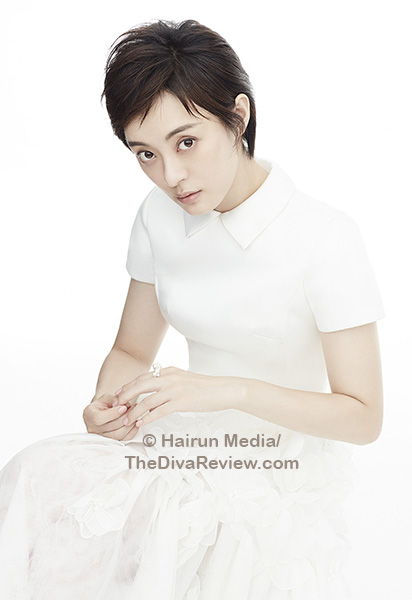
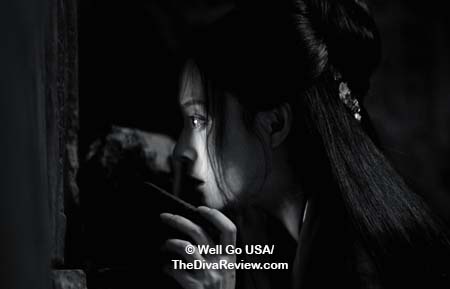 The
Lady Miz Diva: First, please tell us how the role of Madam, the
Commanderís wife, came to you?
The
Lady Miz Diva: First, please tell us how the role of Madam, the
Commanderís wife, came to you?
Sun Li: My husband, Deng Chao, was set to perform in this movie, and I was so excited about that. Then a little bit of time passed, and Deng Chao told me that Director Zhang wanted to invite me to perform in the film, and I was absolutely thrilled, and thatís how I got cast.
LMD: Iím happy to hear that Director Zhang had both of you in mind when he cast the roles. Was that part of the allure of appearing in the film?
SL: It was really interesting to me. I had previously worked with Deng Chao on a number of projects before, but this one was such an interesting challenge to both of us. First of all, to work with such a great director, but also, even though we are husband and wife in real life, the husband and wife that we play in the movie were obviously very, very different from anything that we had performed together before -- anything that we had seen before -- and we really liked the opportunity to have this challenge for acting.
LMD: Please tell us how you initially read the character when you received the script? What were the aspects of Madam on the page that stuck out in your mind?
SL: What really attracted me was the fact that the role that I was playing was a woman in a palace; Iíve done palace dramas, palace movies, palace television shows, most of the time it was sort of a prefabricated stereotype. You know, the beautiful princess, or beautiful queen, who doesnít really have her own volition. That doesnít have to talk to the men in a way that gives them ideas, or helps themselves solve problems.
In this role, because I was really caught between not just the great Commander, who is my husband, but a situation where very complicated decisions have to be made, and choices have to be made, it gave me a lot more opportunity to have volition, and to have ideas, and power, and reactions. And so, it was just a very non-stereotypical role that was offered to me, and I really liked the idea of playing it.
Her feelings were changing -- the characterís feelings were changing and reacting throughout the entire movie. In every section of the movie, she has to make important choices; she has to measure her feelings. She is very complex emotionally. Again, not like predictable emotions; she has to make decisions that have to do with how power should be exercised, how things would be resolved, what was right and what was wrong -- but not just for what was right to do as a woman, what was right to do as a person. And so, it was a very emotionally complex role that I really put myself into and developed.
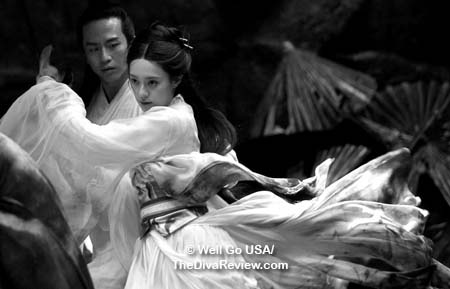 LMD:
True to what weíve come to expect from Director Zhang, he centers the
most important moments around the women in his films. There is so much
importance in Madamís asking to step in during her husbandís battle
training.
LMD:
True to what weíve come to expect from Director Zhang, he centers the
most important moments around the women in his films. There is so much
importance in Madamís asking to step in during her husbandís battle
training.
Not only is she teaching Jing, the body double, that the only way he can defend is to embrace his feminine side, or his yin; she is also showing what a force she is against her powerful husband, and how they have related together as a married couple. The scene changes the entire film.
Please talk about both the mental and physical challenges of that scene.
SL: I really loved the scene, because, as you said, it is so critical in the movie. It was such a breakthrough to not just talk about using the soft to overcome the hard -- using yin to overcome the yang -- but they were actually doing it physically, and it was in a way that showed the yin and the yang side of each of the characters. It was very, very well thought out.
Actually, I started from a very young age as a dancer. And you asked about my preparation for the scene; I love doing action films because it takes me back to my early roots as a performer, as a dancer. I didnít feel it was much of a challenge, physically.
I love action scenes, and I love beautiful dance scenes; so this was something that was not only up my alley in terms of what I was comfortable doing, but it also enabled the character development to move together with the action, and what was happening on scene in a really beautiful way.
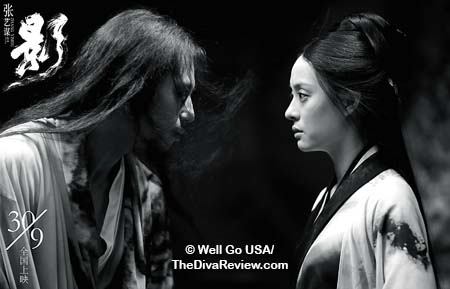 LMD:
Subsequent to that, the sequence of Madam and Commander Yu playing music
together is like an entire movieís worth of romantic drama in one short,
wordless scene. Please take us through the meaning of that scene, and
what they are actually saying to each other?
LMD:
Subsequent to that, the sequence of Madam and Commander Yu playing music
together is like an entire movieís worth of romantic drama in one short,
wordless scene. Please take us through the meaning of that scene, and
what they are actually saying to each other?
SL: Every scene that was constructed -- particularly scenes that I was in with the commander, who was my husband -- every different scene was expressing an important emotional message, that there were different kinds of connections between Madam and the commander throughout the movie.
Itís that scene in particular -- which director Zhang asked us to do over, and over, and over, to get it right -- was about opposition. It was almost an angry opposition. Itís basically Madam saying to the commander, ĎI am opposed to what you are doing. This is not good,í and letting out all of her feelings through this angry opposition. This was also encapsulated inside the battle scene.
This was the ultimate battle scene, this was the ultimate opposition; this was opposition, and anger, and passion, all rolled up into one complete scene that was a story within a story, but also wrapped within a bigger story. It was really supposed to be the most dramatic shocking, high point of the energy and repressed anger that was there in the movie all along.
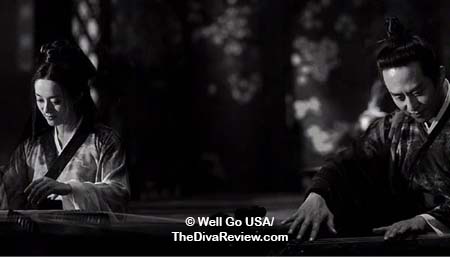 LMD:
Related to the music scene, there is the memorable moment is when the
couple is asked by the king to play for him, while he is allegedly
unaware that Jing is an imposter. Was Madam afraid that she couldnít
perform with Jing, or that she could?
LMD:
Related to the music scene, there is the memorable moment is when the
couple is asked by the king to play for him, while he is allegedly
unaware that Jing is an imposter. Was Madam afraid that she couldnít
perform with Jing, or that she could?
SL: Because Madam knew that Jing couldnít perform on the lute -- he hadnít learned enough; his training had been more military training, and he really couldnít perform -- thatís why after that scene, they went back and practiced more. What it also shows was that he was very quick-witted, because he figured out a way to explain why Madam was not playing, which gave him an excuse to not play.
His explanation involved because the commander had not yet performed his task of taking back the ancient city of Jing. Madam, and the commander, as well, thought that there should be no luxurious pleasure or entertainment in the palace to distract the commander from his task. That it would somehow be unfitting to perform something beautiful and luxurious when they had failed to do what they were supposed to do.
It shows that not only was she looking after the body double, but she was really quick on her feet and smart, and she saved the situation. Then the body double realised what she was doing, and he then came on board, and also got into the role play with her. So, it was the first example of a scene that Madam and the double are really developing a relationship, and almost a partnership in performing the roles of husband and wife.
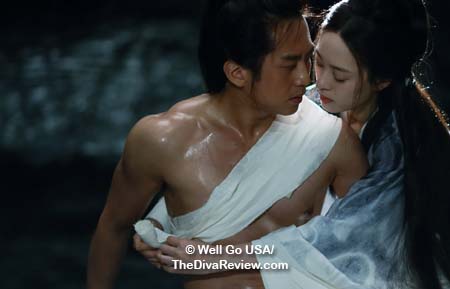 LMD:
Did Madam see Jing as another man altogether, or was he a remnant of
what her husband was before he became wounded and twisted with revenge?
LMD:
Did Madam see Jing as another man altogether, or was he a remnant of
what her husband was before he became wounded and twisted with revenge?
SL: At the very beginning, and through much of the film, both Madam and Commander really did view the Jing character as a shadow, who was specifically brought on to be the mercenary who comes on to perform what the commander would and could have been able to do, himself, had he not been grievously wounded. It was a much more sort of opportunistic, functional kind of relationship, and Madam just had to learn to play the role within it.
Yet, was there some way in which he reminded her of her husband? Superficially, yes. But rather than it being a case of it was easy for Madam to have feelings for him because he reminded her of her husband, what I focused on was it was the best thing for her husband to have found this body double, and trained him, because somehow her husbandís ability to accept this character, this person, made it easier for him to accept that it was necessary to have this body double play this role of the commander with the wife.
In other words, it was almost the only circumstance where she was essentially put between two men. But as time went on, she began to understand that he wasnít just some sort of tool, or an empty vessel; that he had his own thoughts, his own ideas, his own volition, and his own personality. He was definitely not just a shadow; he was a real person.
It was then that she started to actually have feelings for him as a real person, but at the same time, because of the importance of her role as the Madam of the great Commander, she could never openly acknowledge her feelings for him. Of course, there was that one night before the great battle, but she always had maintained restraint vis-ŗ-vis him, through the very end.
 LMD:
When dealing with such emotionally strong, intense material, were you
able to leave Madam on the set at the end of the day?
LMD:
When dealing with such emotionally strong, intense material, were you
able to leave Madam on the set at the end of the day?
SL: Because my husband I were working on the set together all day, and we usually went home together, it wasnít any kind of thing where I couldnít get out of my character; it was actually more that Deng Chao and I would talk about our characters, and how we were developing the characters, and actually sharing information and feedback with each other, to help prepare for what we would be filming the next day.
So, it was a very easy and comfortable way, because we have no issues communicating with each other. Itís not like people being on the set in the day, and then going their separate ways in the evening: We would continue to work on things and mull things over and digest.
Also, because Deng Chao is also a director, he would share with me how he thought the movie was progressing from a directorial point of view, and what he thought Zhang Yimou was expecting and hoping to achieve, so that helped me out a lot, as well.
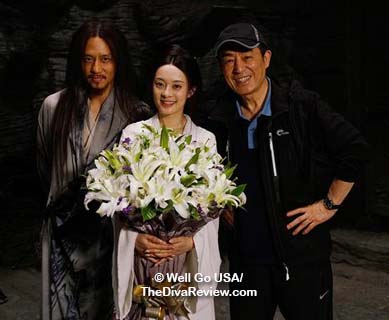 LMD:
Please talk about the technique of Director Zhang. Was he open to your
interpretation or additions to Madam that were not on the page? Did you
have the freedom to realise the character as you saw her?
LMD:
Please talk about the technique of Director Zhang. Was he open to your
interpretation or additions to Madam that were not on the page? Did you
have the freedom to realise the character as you saw her?
SL: Iíve always been a fan of Zhang Yimouís movies and admired them so much. This particular movie that he decided to adapt the ink brush painting style; it was such a brilliant idea, and a wonderful challenge. And all the actors, including myself, were so proud when we saw this movie for the first time; that despite all the challenges of being what was sort of a black-and-white movie and only gave us a little bit of a room for color, that it ended up so beautiful, and worked so well with the style. We are very proud of the movie.
With regard to Director Zhang, he is a very open director: He loves to take in ideas, experimental suggestions from the actors. Heís really open. Zhang, himself, has done some acting; so he understands something about what it means to be an actor.
Yes, it was a great collaborative effort, but at the same time, he had this very clear idea of what he wanted to achieve with the film. So, at the same time as he was open to suggestions, he was also always pointing them in the direction of where he wanted to go with this, so he always kept that in mind.
~ The Lady Miz Diva
April
25th, 2019
~ With Special Blessings to Ms. Ellen Eliasoph and Ms. Jing Xu for their invaluable assistance. ~
Click Here for our
Exclusive Interview
with SHADOW
star, ZHENG KAI.
© 2006-2022 The Diva Review.com
|
|















































